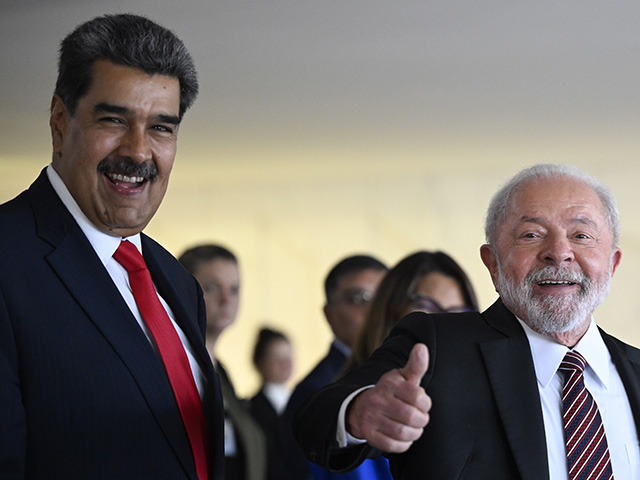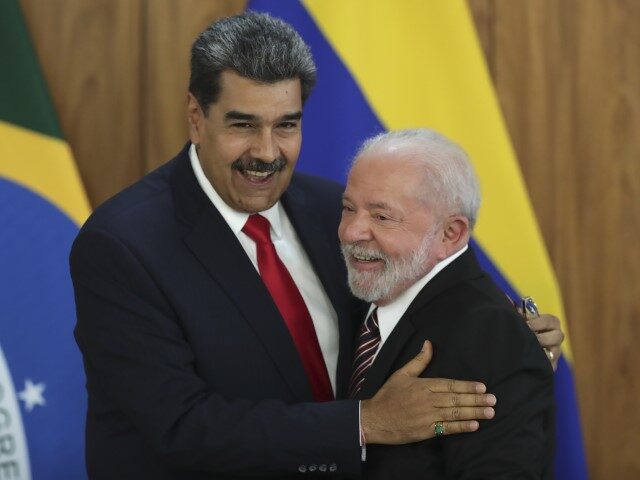CARACAS, Venezuela — Brazilian radical leftist President Luiz Inácio Lula da Silva signed a decree over the weekend that authorizes the purchase of electricity from neighboring Venezuela, a nation plagued with daily blackouts as a result of years of gross socialist mismanagement.
The electricity that Lula’s administration wants to purchase from the Nicolás Maduro regime will supply Roraima, a northern state that neighbors Venezuela. Due to geographical difficulties, Roraima is the only Brazilian state not connected to the country’s national power grid. As a result, it must rely on diesel-powered plants for its electricity.
Brazil had been paying Venezuela to directly provide Roraima with electricity since 2001 after Lula signed an agreement with late socialist dictator Hugo Chávez. The service was interrupted in 2019 during the administration of former President Jair Bolsonaro after he decided to cut diplomatic relations with the socialist Maduro regime.
As part of the agreement signed between Lula and Chávez, Roraima received power through a direct connection with Venezuela’s Simón Bolívar Hydroelectric Plant — more commonly known as the “Guri Dam” — the nation’s now ailing main power plant built in 1978.
During the official signing of the decree, Lula reiterated that he will “rebuild” the public policies implemented during his first two terms (2003-2010) and during the administration of his protege, Dilma Rousseff (2011-2016), which had been “abandoned” by former presidents Michel Temer and Jair Bolsonaro.
In May, socialist dictator Nicolás Maduro offered Lula a deal to provide electricity to Brazil after both held an official meeting in Brasilia, noting that a $5 million investment was required to reconnect Roraima with Venezuela’s Guri plant. He did not suggest that Venezuela would make that investment.
“Venezuela is prepared to rebuild electric cooperation with the state of Roraima, Boa Vista, and the entire border population,” Maduro said on Monday. “We have an offer of 120 megawatts ready, what it merits is a basic investment of about four or five million dollars in function of rebuilding the transmission lines.”

Brazilian President Luiz Inacio Lula da Silva bids farewell to Venezuelan President Nicolas Maduro after a luncheon at the Itamaraty Palace in Brasilia, Brazil, May 29, 2023. (Photo by Mateus Bonomi/Anadolu Agency via Getty Images)
“That line of Guri has to be put into operation because there is no justification for Roraima to be the only state outside the Brazilian energy matrix, working on the basis of thermoelectric power, much more expensive, very polluting,” Lula said in May during a joint press conference with Maduro.
According to unnamed alleged official sources cited by the Spanish news agency EFE, the subject will be discussed next week, when Maduro will travel to the city of Belém to participate in a summit of presidents of Amazonian countries organized by Lula.
Venezuela, after more than two decades of socialist mismanagement, has been left with a constantly failing power grid unable to consistently provide power to all of Venezuela’s territory. As a result, Venezuelan citizens have endured more than a decade of constant, near-daily blackouts that on average last six hours or more. Some of the most affected states have faced blackouts since 2009 when Venezuela began to experience the first symptoms of socialist collapse.
In 2010, Hugo Chávez responded to the nascent electrical problems by implementing a series of rolling blackouts, describing the measure as a response to an “electrical emergency” allegedly caused by a drought that affected Guri’s power generation. In reality, according to experts, the deficiency in Guri’s power output is caused by the lack of investment in maintaining and modernizing Venezuela’s power grid.
The Venezuelan socialist regime has taken no meaningful action to resolve the issue in over a decade and the rolling blackouts have worsened since 2016.
The Guri power plant, which would provide Brazil with power under the proposed agreement, suffered a catastrophic collapse in March 2019 that left the country without power for almost an entire week. A second series of nationwide blackouts occurred shortly thereafter that month.
The Maduro regime blamed the collapse of the critical power plant on an alleged “cyber attack” orchestrated by the United States and directed by U.S. Sen. Marco Rubio (R-FL).
The Venezuelan Committee of People Affected by Blackouts, a civil organization, announced in June that electrical failures had increased throughout 2023, going from 3,296 registered incidents in January to 10,013 in May.
Caracas, as Venezuela’s capital city and the socialist regime’s seat of power, has been largely kept exempt from experiencing the sheer blunt effect of Venezuela’s collapsing power grid — even so, lengthy blackouts that affect the capital city have become more common in recent months.
Brazil’s Energy Minister Alexandre Silveira told the local TV channel GloboNews that stopping energy purchases from socialist Venezuela was an “ideological decision” by Bolsonaro.
“A decision opposed to the public interest [to stop] buying this energy from Guri and [start] buying energy from three plants: two gas and one oil, putting more than 40 trucks a day on [Brazilian Highway] BR-174 taking diesel oil to the plant,” Silveira said on Friday.
Silveira explained that the new decree allows not only for the purchase of power from Venezuela but also determines the establishment of national policies for “electro-energy integration with other countries” and opens a path for possible connections with Argentina and Uruguay, which the Minister claims will be the starting point “for South American electricity interconnection.”
Christian K. Caruzo is a Venezuelan writer and documents life under socialism. You can follow him on Twitter here.

COMMENTS
Please let us know if you're having issues with commenting.